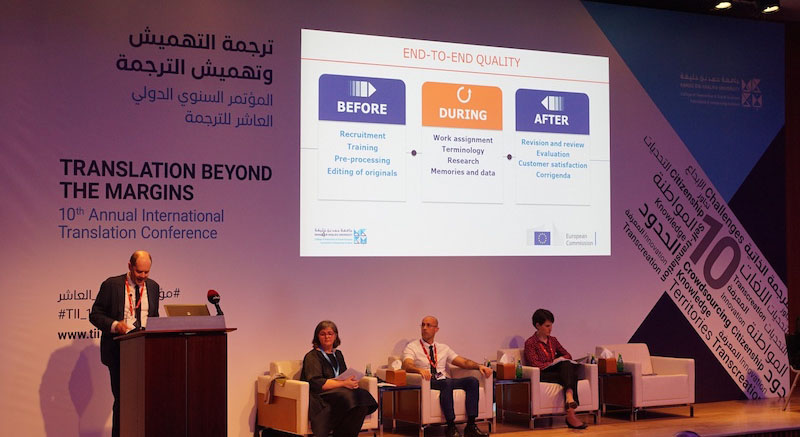The Translation and Interpreting Institute (TII), part of the College of Humanities and Social Sciences (CHSS) at Hamad Bin Khalifa University (HBKU), today concluded its 10th Annual International Translation Conference, held at the Qatar National Convention Centre (QNCC) on 26-27 March.
In attendance were HE Hamad Bin Abdulaziz Al-Kuwari, State Minister; HE Li Chen, Ambassador of the People’s Republic of China to the State of Qatar; HE Ajay Sharma, British Ambassador to the State of Qatar, and senior representatives of the Qatar Foundation and HBKU.
Forty-three speakers from more than 20 countries converged in Doha to explore topics on translation and interpreting under the theme ‘Translation Beyond the Margins’. Dr Amal Al-Malki, Founding Dean of CHSS, delivered the opening speech. As part of her inaugural remarks, she showcased the advanced speech translation system developed by HBKU’s Qatar Computing Research Institute.
Dr Joselia Neves, a professor at TII, chaired the opening panel, ‘Sparking the Discussion’, with panellists Rytis Martikonis, Director General for Translation at the European Commission, Dr Sofía García-Beyaert, Founder of Arcos Institute, and Dr Miguel Á. Bernal-Merino, Senior Lecturer in Translation at the University of Roehampton. The panellists spoke on ‘Framing the Societal Value of Community Interpreting; Translation and Localisation of Multimedia Interactive Entertainment Software‘; and ‘European Public Service Translation: Care, Be Aware, and Dare’, respectively.
Dr Amal Al-Malki said:
Translation is an attempt to make sense of the world beyond the linearity that the pages of a book might suggest. Like writing, translation is an act of agency, a choice, a decision and an ideology. You cannot discuss translation in isolation of ideology and power relations. In TII’s 10th conference, we have taken the challenge to go beyond the margins by celebrating linguistic and cultural diversity and breaking down barriers. We also go beyond the margins by fostering collaboration and supporting innovation.’
Topics covered during the two-day event included translation, crossovers in interpreting, audiovisual translation, transcreation and self-translation; innovation and transgression in researching translation and related areas; translator training beyond the classroom; translation norms and transgressions; translation for active citizenship; and translation beyond the word.
Panel sessions on the first day of the conference included ‘The Old, The New, The Local, and The Global in Literature; The Translation and Interpreting Profession’; ‘Translation Technology Bridging Disciplines’; ‘Approaches to Linguistics from New Perspectives’; ‘Highlighting Difference through Literature’; ‘Activism in Translation and Translation for Activism’.
On the final day, panel discussions explored ‘Writers in Translation; Audiovisual Translation, Mainstream and Beyond’; ‘Translation Studies and Profession; and Cultural Transadaptation in New Context’; and ‘Synthesis and Future Horizon.’
Meanwhile, two workshops held during the conference enabled translation students and translators to advance skills in areas that are critical within the field.
For more information on TII and its events, please visit tii.qa






